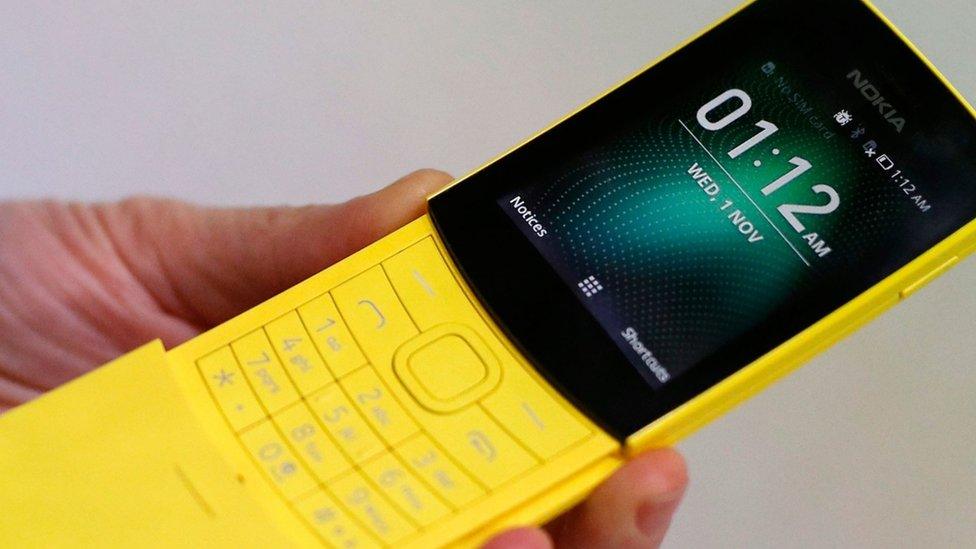Tech Tent: Has the phone industry hit a road bump?
- Published

For a decade it has been the fastest moving, most dynamic industry on Earth - but has the smartphone business just hit a bump in the road?
On the Tech Tent podcast this week, I report from Mobile World Congress in Barcelona where despite the hype about 5G and augmented reality, a nagging question hung in the air: has phone innovation slowed to a halt?
Stream or download, external the latest Tech Tent podcast
Listen live every Friday at 15.00 GMT on the BBC World Service
Mobile World Congress is the event where you see what clever tricks all the mobile giants - apart from Apple - have been working on.
But this year only two launches caught the eye: Samsung's blockbuster unveiling of the Galaxy S9, where we all got to "handle" the phone via augmented reality, and the Nokia event.
Nokia - once a dominant player in the phone industry - is making a comeback under the brand's new owners HMD Global. After revealing that it had sold a very respectable 70 million phones last year, including millions of the retro 3110, HMD repeated its trick of bringing back an old favourite alongside a new range of smartphones.
According to chief executive Florian Seiche, the new Nokia 8110 "bananaphone" will be a gentle introduction to apps such as Google Assistant, for people who have yet to enter the smartphone era.

Nokia brought back its "bananaphone"
At least it looks different - something you cannot say about Samsung's state of the art Galaxy S9. Ben Wood of CCS Insight told Tech Tent that this was an "iterative device" that will still do well because of the Korean giant's sheer marketing muscle.
But Mr Wood, who has been coming to MWC for 20 years, was disappointed by what he called "a sea of smartphone sameness".
He fears for some of the industry's smaller players: "If you don't have a brand and you've got a 'me too' Android phone that looks the same as all the rest, and you don't have any money to put behind it, you're going to struggle."
We got a different perspective on innovation in phones from the designer of the original Nokia 8110, Andrea Finke-Anlauff. She was surprised and delighted to hear that HMD Global was bringing it back: "It gives me the confidence that user experience is really the key thing to make things long-lasting and working for people."
She said the 8110 was a hit because it looked good with the slider both open and closed, and because it made users feel they had a measure of privacy. Today's phone designers, she says, have very little freedom - they have to give people a large screen because devices are all about consuming content. But she wonders whether her idea of a sliding cover could make a comeback.

Andrea Finke-Anlauff, designer of the original Nokia 8110
The lack of standout new features could be one reason for last year's dip in smartphone shipments. It seems that consumers are getting more cautious about upgrading when it is not obvious that the latest model is much of an advance on what they already have.
But one company has few reasons to worry about this bump in the road for the industry. China's Huawei has come from nowhere to claim - by some measures - third place in the global smartphone market. The only cloud in the sky is fierce resistance to its ambitions from American politicians who have leaned on mobile operators, persuading them not to offer the company's phones.
Internet-connected boots
When I spoke to Richard Yu, Huawei's head of mobile, he told me that it was America's fear of competition that was behind the political pressure to keep his company out.
Remarkably, the following day another Huawei executive rowed back,, external saying Mr Yu did not speak for the company. Chinese firms usually tread a very careful line when it comes to trade disputes - Mr Yu gave us a rare insight into what they really think.
So what was the big theme from Mobile World Congress? In recent years there have been plenty of stands touting wearables and a big presence from the motor manufacturers touting connected cars. Neither were much in evidence this time.
What you could not escape was 5G. Everyone from Korean operators to Ajit Pai - America's Federal Communications Commission boss - was promising to lead the world in the next generation of mobile networks.

Huawei's Richard Yu
But let us face it: getting excited about a new acronym that promises to connect things - rather than people - to the internet is quite hard.
On the other hand, when I got off the plane from Barcelona and someone asked me about the most impressive thing I had seen at Mobile World Congress, I told them about the internet-connected construction site boots that can send a message if the wearer is in danger.
They were smart, connected - and a much more interesting design than the rectangular slabs of glass unveiled at every smartphone launch. Maybe the Internet of Boots is the answer to perking up the mobile industry.
Stream or download, external the latest Tech Tent podcast